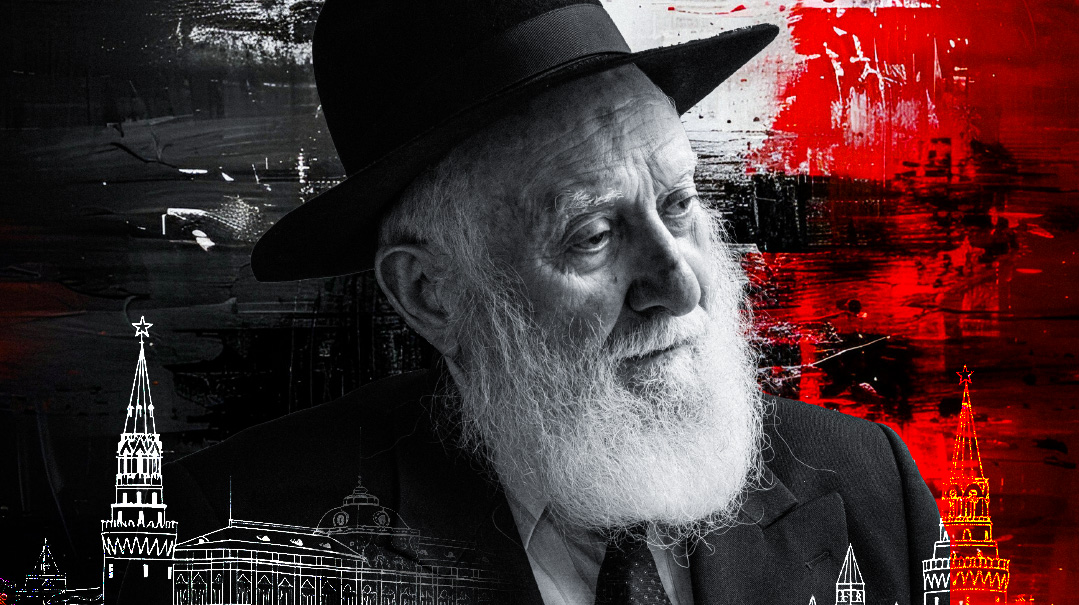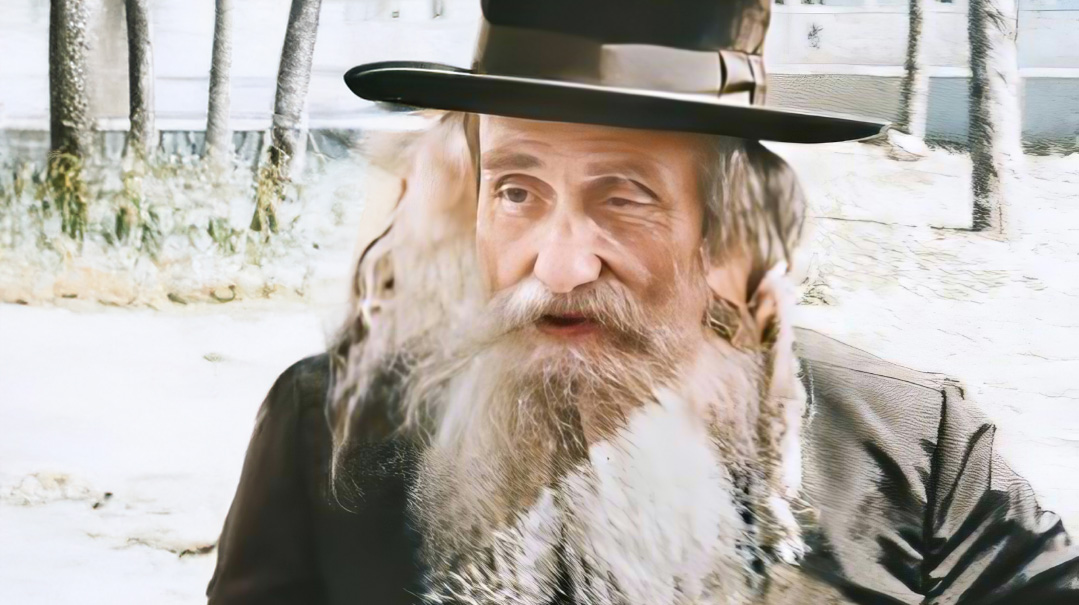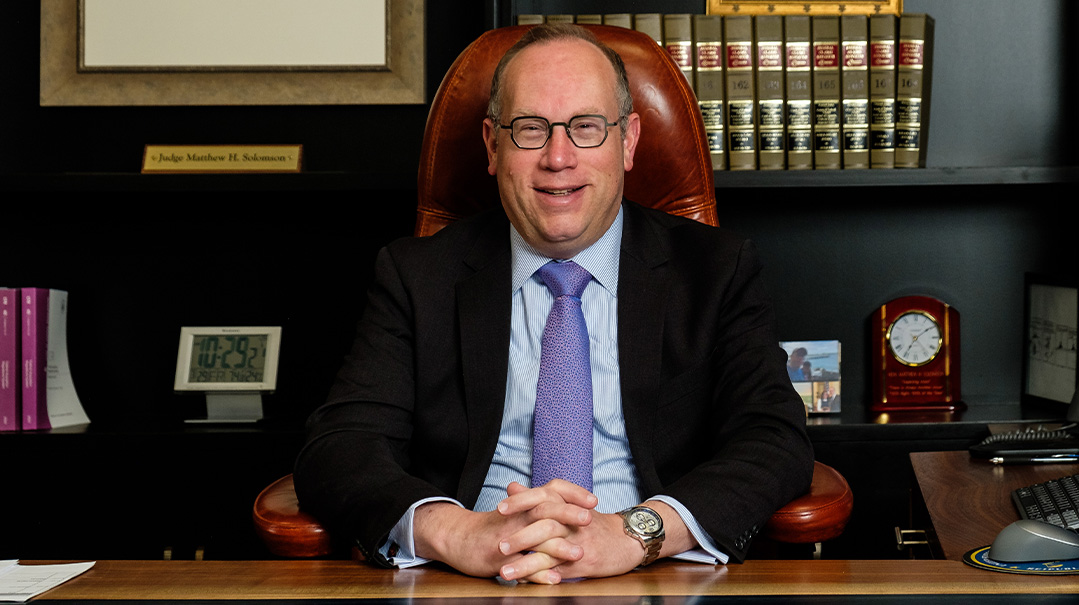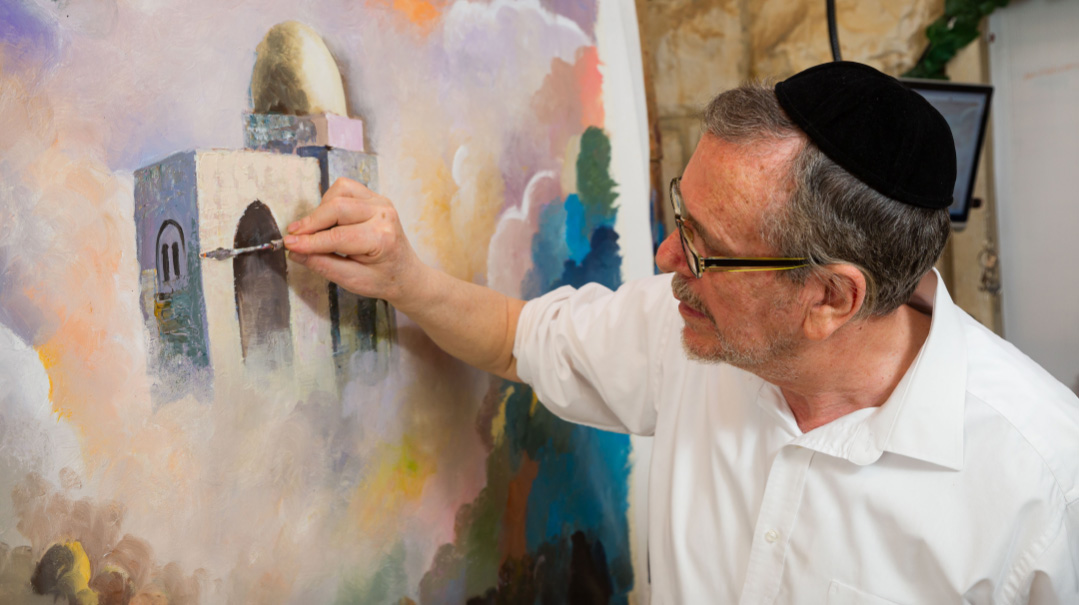Old Crown, New Guard

Can the Shas Party’s fresh lineup rally the Sephardic masses?
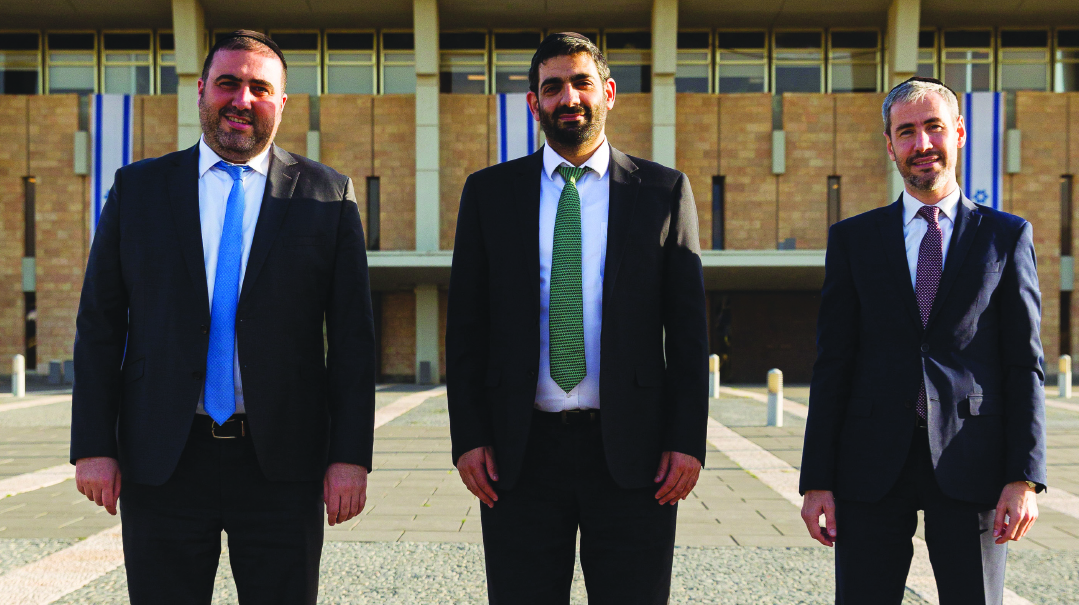
Photos: Elchanan Kotler
A few weeks before Israel’s fourth elections, the flat-screen in the Knesset lobby shows that the building is almost empty, so finding three Shas MKs sitting together in a room shouldn’t take too much sleuthing.
Along the way to the party’s faction room there’s abundant evidence of the pandemic stalking the land. The long corridors are no longer filled with hurrying aides; galleries are shrouded in plastic sheeting; and cafeterias are stripped of tables and bereft of political chatter.
Even reaching the bottom floor of the Knesset building, all evidence of Shas is gone. The door to the party’s committee room is open, the large oval table is still there, but the massive portraits of Rav Ovadiah Yosef have vanished. Instead of the expected Shas MKs are functionaries from the election committee who don’t bother to glance up from their computers.
Finally, it’s several minutes past the time for our scheduled meeting when it turns out that the trio happen to be working their phones in the depths of a darkened conference room upstairs these days.
“We’re Knesset members,” Micha’el Malkieli’s impish greeting comes out of the gloom, as Moshe Arbel and Yossi Tayb join in, “you think we have all day?”
***
Welcome to the world of Generation Shas. Three very different politicians, with varied backgrounds, but all children of Rav Ovadiah’s Torah revolution. Coming from careers at the intersection of kiruv and local activism, they’ve been propelled into national politics while just in their thirties, as part of Aryeh Deri’s drive to remake the movement of “Maran.”
“The fact that I’m here today shows that they succeeded,” says Malkieli, 38, the leader of the three, who was transfixed as a child by Rav Ovadiah’s legendary shiurim in Jerusalem’s Moussaioff shul. “I can remember Maran comparing the small handful of yeshivot we had with the massive Ashkenazi yeshivah world.”
Born in middle-class Petach Tikvah, Moshe Arbel, one year older, went to local yeshivos while maintaining a similar Shas family affiliation, before rising through the ranks as Aryeh Deri’s chief of staff. And Yossi Tayb, raised in Sarcelles, a Parisian suburb, joined Rav Ovadiah’s live-streamed shiurim as they were beamed into France in the ‘90s — an influence he credits with the local community’s Torah revival.
Despite the dimness of the large conference room, now bereft of the iconic meetings serviced by drinks-bearing ushers, the freshmen MKs are identifiable by their neckties alone.
The jaunty angle of his green tie proclaims Malkieli’s yeshivish identity as a Chevron graduate; the precision of Moshe Arbel’s blue number speaks of his legal background; and a certain je ne sais quoi is a dead giveaway for Yossi Tayb’s French heritage.
But if the three are cut from the same cloth, the sartorial differences point to Aryeh Deri’s strategy. In his quest to remake the party for a new generation, the Shas leader has axed the old-timers — retiring deputy Finance Minister Yitzchak Cohen and MK Yaakov Margi, both Knesset veterans whose removal this election cycle at what seemed to be the height of their influence, came as a surprise. In their places, Deri has given eight of the top ten spots on the list to Shasniks in their thirties. His focus has been to bring in people with new expertise and who can tap fresh demographics.
Our conversation provides a ringside view of young politicians finding their footing in Israel’s big leagues and climbing the greasy political pole, highlighting the interdependence of Torah and political activism in the country. We touch on flashpoint topics like police violence and chareidi responsibility under coronavirus. But the talk — interrupted by parliamentary aides and buzzing phones — also raises questions about Deri’s long-term strategy.
As they strain to bring in new voters, can the increasingly chareidi-leaning Shas party — which had previously gotten its strength from a traditional Sephardi voter public — truly become a national force again? The MKs are reluctant to be drawn into a numbers-game about who will form the next government, but how can they prevent the draining of vast numbers of potential Shas votes to the juggernaut called Bibi? And talented as these proud Shasnikim are, is Deri indeed building up successors, or simply cementing his long-term dominance of the movement?
Nothing Like Experience
“If someone would have told me seven years ago that I would be here in the Knesset, I’d have said they were crazy,” says Micha’el Malkieli. “I was teaching in a yeshivah, planning to raise my children as talmidei chachamim.”
In a building where artificial humility is the stuff of too many maiden speeches, it’s a bold claim to make. But there’s something genuine about the way Malkieli says it. And even if along the way, the young MK did have an inkling that the political big leagues were a possibility, he has enough mileage in Torah teaching to bear out his words.
Raised in Maalot Dafna (“Maalos Dafna” he says, imitating the American pronunciation of his neighbors), he went to school in Yakirei Yerushalayim, a flagship Sephardi cheder. Next came the Chevron yeshivah, a Torah bastion that happens to be a favorite of the upwardly-mobile, like his political patron Aryeh Deri himself, and then Malkieli went on to teach in various yeshivos for almost ten years before heading into politics via the Jerusalem city council. Still today, he prides himself on the large kiruv minyan that he leads for struggling youth in the Ben Shemen Children’s Village on Yom Kippur.
The Torah learning background is something that the trio share. Like Malkieli, Moshe Arbel, born in 1983, received a Litvish education in the local Yeshivas Nachalas David, headed by Petach Tikvah Chief R,abbi Rav Baruch Shimon Salomon a”h, and spent years in kollel.
After his family made aliyah to Telshe Stone, Tayb also followed the path of an avreich, first in Mir under Rav Yitzchak Ezrachi, then on to kiruv abroad in Marseille after marriage, and then back to Israel as a manager of a Wolfson Fund-affiliated program for French olim.
That shared background at the interface of yeshivah, kiruv, and local politics is part of a pattern in Shas, and gets to the heart of how the party views itself.
Founded in 1982 by religious Sephardic politicians frustrated by their marginalization within the Agudas Yisrael party, Shas first competed in the Jerusalem municipal elections in 1983. By the next year, Shas became a national movement headed by Rav Ovadiah Yosef. It’s slogan — “lehachzir atarah le’yoshnah — to restore the crown to its glory,” encompassed both the religious and social regeneration of the Jews from Eastern countries who were widely disdained by Ashkenazi elites.
Those twin aims have been reflected for decades by the portfolios that Shas has chosen: The Interior Ministry, from which the party has protected the status quo in terms of marriage and giyur, has long been a Shas stronghold, as well as the Welfare Ministry, among others.
Over the years, and with the party growing from four seats in 1984 to a peak of 17 in 1999, leading Sephardic rabbanim such as Rav Yaakov Yosef, the eldest — and notably brilliant — son of Rav Ovadiah himself, served as Knesset members, alongside other Shas politicians.
That has meant a symbiotic relationship where political power is exercised to grow a school and yeshivah network, many of whose graduates vote for the party. That of course is not unique to Shas — the Ashkenazi Torah world is kept afloat by Degel HaTorah and Agudas Yisrael. But the links between Shas as a political project and Shas as a holy movement are more sharply defined.
If the three politicians have sincerity and youth in common, that’s where the similarities end, because they bring very different skill sets to the Knesset.
With almost five years of Knesset service under his belt, a relatively young Malkieli is already — thanks to the absurd turnover in Israel’s parliament — a veteran lawmaker, with more mileage than some of the outgoing ministers. “I’ve been able to bring more than ten bills into law,” he says, “and discovered how to do the Sisyphean work to get a bill through the system.”
Under Malkieli’s name, the Knesset website lists bills from the pedestrian (ending a surcharge for large bottles of drink) to national security (such as revoking citizenship for terrorists). There are laws for the chareidi sector, such as affirmative action for chareidim and Arabs in public service, and surprisingly non-sectoral bills such as including subtitles on television broadcasts.
The key, he says, is experience, because there’s no comparison between someone in the Knesset ten years, and someone there for twenty. Having the most experienced politician in the Knesset at the head of the party (“Aryeh Deri was sitting in Yitzchak Shamir’s cabinet when today’s ministers were Abba shel Shabbat in kindergarten,” he says) is an invaluable aid when so much is built on knowledge of how best to grease the wheels.
The legislative process as Malkieli describes it as tortuous. An idea for a law or amendment germinates in discussions with people on the ground and experts in whatever field is relevant, and is then given legal form by the MK’s legislative aide. It then goes to the Knesset’s own legal staff who ensure it fits with other relevant laws, and then moves to the Knesset in the first reading. Scrutinized in the parliamentary committees in various stages, a process that takes months, it emerges for its second and third Knesset readings — the final vote — a very different creature than it entered.
“I’ve learned that you have to put in a certain number of ‘goats’ — additions to the law that you’re able to sacrifice — because the bill never survives the Knesset gauntlet as it went in,” he says.
And along the way, Malkieli has learned about his power as a lawmaker. “When someone has a problem — say with the Bituach Leumi [national insurance] — I can pick up the phone to a bureaucrat there. He’ll help me, because tomorrow he needs my vote to get something through a Knesset committee.”
Legal Eagle
If Malkieli is the star all-round lawmaker, his colleague Moshe Arbel’s political activity is more focused on legal issues.
Only a few months into his Knesset career in 2019, Arbel became Deri’s golden boy when he shot to national prominence defending chareidi values in court. In August that year, the municipality of Afula, a sleepy northern town, sponsored a concert by chassidic singer Motty Steinmetz. Intended for the chareidi residents, the event was advertised as having separate seating — a policy that enraged militant liberal groups.
“They pressured the Afula municipality to cancel the concert, even though it was only one of dozens of events staged that summer for secular residents,” says Arbel.
That’s where the Shas newcomer took over, arguing the case before a Christian judge. “We contrasted this situation to that in a landmark US ruling, Brown vs. Board of Education, that declared that separate but equal, as in segregated schools in the American South, is discriminatory. I argued that here it is halachah, a legitimate religious right to separate seating that even women wanted to implement.”
There’s something incongruous about hearing the references to US law roll off the tongue of a product of the Shas system. But it’s precisely that less hard-nosed and strident tone that Arbel brings to the table. This is not the aggrieved religious underdog that characterized Shas-speak for many years, but the tone of a man who’s comfortable in his role as deputy-speaker of the Knesset, representing official Israel with one eye on British tradition (“we get a lot of the pomp from Mandate times”) and another on the easygoing nature of Israeli lawmaking, where he recently allowed Degel HaTorah MK Yitzchak Pindrus to filibuster by a two-hour-long parshah shiur.
In the course of the conversation with Arbel, there’s more in that vein, including professions of respect for some of those across the aisle. Many people are fascinated by MKs who are sometimes at violent-sounding loggerheads in front of the cameras, but are really friendly behind the scenes. Unlike Malkieli, who says, “I’ll tell you after the elections,” when asked about who he works with in other parties, Arbel is upfront. “Meir Cohen, former Welfare Minister from Yesh Atid, and Osama Saadi from the United Arab List,” he says.
But perhaps the biggest surprise about the measured lawmaker is an emotional attachment to social action.
Arbel passed a law to stop Israel’s poorest being forced to pay interest on debts that they can’t afford. “The absurd thing was that even where a judge assessed that they could only afford payments of, say, 300 shekel a month, they were still charged hundreds more in interest.”
And for a man raised in a comfortable family in Petach Tikvah, it wasn’t exposure to the poverty of Jerusalem’s poor shechunot that gave him his social conscience: It was clerking for the Ramle District Court.
“One day, a debtor came in front of the court, and afterward the judge said to me, ‘You see that man? He’s a third-generation debtor. I knew his father and grandfather.’”
“Poverty can be a cycle that goes from one generation to the next,” says Arbel. “We have to break that systemic failure.”
French Revolution
For someone who wants to understand why Yossi Tayb has been catapulted into the Knesset, one way is to head for Bayit Vegan, the western Jerusalem neighborhood that has long become a bastion of a yeshivah-oriented French community. Alternatively, a stroll down Tel Aviv’s Rechov Bugrashov, a main artery with French boulangeries and patisseries scattered like sugar icing, is instructive. Or you could open the fridge in many an Israeli supermarket, where French-style artisan meats and sausages — a far cry from the chemical-laden fare Israelis are used to — have started sprouting like truffles.
With more than 20,000 French immigrants in the last five years alone, the community has become electorally significant, and Shas, with its long-standing links to the French Jewish community, has been quick to react.
“Most French Jews are strongly traditional,” says Yossi Tayb. “They know that we are part of the right, and that we look after Jewish tradition in the country. That’s where we can appeal to them.”
In the Knesset just seven months, it’s been a steep learning curve for Tayb, who has discovered just how much sweat and tears goes into lawmaking. Soon after being sworn in, he started work on a bill to help foreign podiatrists convert their qualifications into an Israeli equivalent. It’s an illustration of just how small-bore the actual grunt work of politics can be.
“It sounds very insignificant,” he admits “but the law came directly as a result of people I’m meeting who’ve moved here and can’t work. And there’s no way to do anything bigger, because of the crazy bureaucracy. Each profession has its own criteria, and attempting to pass a mammoth, all-encompassing foreign qualifications bill would fail — it could fall hostage to so many actors, different interest groups and lobbies. So we need to work to fix the holes and cracks in existing laws.”
In that learning curve, Yossi Tayb has been able to lean on the broad shoulders of his colleague, Micha’el Malkieli. “Of course I was nervous to join the Knesset,” he says. “And I’m still nervous. To leave a stable job in the private sector, in endless elections when you could be left out of the next Knesset — it’s hard. But then you think of the greater shelichut — what you’re able to achieve for people with the power of your phone, and then it’s worth it.”
Talking of phones reminds Tayb of the hundreds of calls he’s received over the last few weeks, as French-Israelis have been locked out of their new country by Israel’s sudden and draconian closing of borders. “We’ve never had such a situation before — some of these people are old or sick and they can’t get in. I’ve been working to try to bring in 240 people from Paris, but until now there has been no relief flight.
“I was showering for Shabbat a few weeks ago,” he continues, “when I got a call from a family whose mentally-ill son had been stopped in the airport in Paris. He had no access to kosher food. With a few phone calls, I was able to talk to authorities there, and to Chabad and the chief rabbi’s office. When you get a call like that, you just have to move heaven and earth.”
They Want Tradition The acrid smell of Bnei Brak’s burning bus and the bang of stun grenades in the city’s streets are still, metaphorically speaking, drifting across Israel when we sit down together in the Knesset. Regarding the sky-high tension between the country’s chareidi and secular demographics in the wake of corona, do these new-generation MKs remember such pervasive distrust?
“I can only answer for Shas,” says Malkieli carefully. “But Aryeh Deri, instructed by Chacham Shalom Cohen, said from the beginning: We prefer an angry tzibbur to a dead tzibbur. We have to respect what health authorities say, and that’s why we closed our shuls and schools.”
And yet, although Shas-affiliated institutions have been closed in accordance with government guidelines, tension is running high across the chareidi world, inflamed by perceptions of selective and heavy-handed policing.
In one notorious case a few weeks ago, police detained a fellow named Yosef Flesichman, a visibly-unstable individual familiar to those who know the streets of Jerusalem’s Beis Yisrael neighborhood. They marched him away in the night-time rain, with no shoes on, and then released him hours later. Totally disorientated, he disappeared into a nearby forest and almost died of hypothermia.
Moshe Arbel has ensured that the case is investigated by the Justice Ministry, and says that there is indeed a “systemic problem” with the police, but that the way forward is greater training, and for the Knesset to monitor law enforcement via their body cameras.
“Yet at the same time, I’m against judging by shaky videos that emerge on websites, with no context,” he says. “You need to know what happened before. And moreover, health laws are there for a reason — and the police are meant to enforce them.”
But policing is only one of the issues that have emerged on the chareidi-secular fault line during this pandemic year. Against the backdrop of a fourth election, which features many parties calling for a secularization of Israel’s marriage and Shabbos laws, how long can Shas hold the line? Is the tide of public opinion not against them?
“I can tell you what I see as a rabbi of a shul on Shabbat,” says Moshe Arbel. “There are people who say, ‘don’t give me an aliyah this week because I drove to the beit knesset.’ These people get no attention in the media, but there are many of them. They know what is right, and they want the public sphere to keep Jewish tradition.”
Arbel is sensitive to how the religious appear to those across the political and cultural divide. But he’s convinced that the majority of the country want to keep the status quo. “The Israel Democracy Institute said that 90% of Israeli Jews keep kosher,” he notes. “At the end of the day, most of the 120 Knesset members want to observe the status quo.”
Narrowing Appeal
“Scratch a Jerusalem taxi driver,” one might adapt a French phrase, “and you’ll find a Likudnik.” It’s something that repeated cab journeys tend to confirm. Most taxi drivers in the capital seem to live in Maaleh Adumim, and vote Bibi.
And therein lies the giant “but” hovering over our conversation. Because although Shas has a wonderful young lineup of politicians, there were days when many of these cabbies — and others like them across Middle Israel — gave the party significantly more power. In 1999, the party took 17 seats, and in 2006, they still had 13. Today, a tenth seat is the goal.
You don’t need to go far from the Knesset to understand why. A few blocks away, on a long line of giant billboards where the Begin Highway meets Kiryat Moshe, and next to the corona-shuttered hotels, the party’s campaign stares you in the face. Against a yellow background, Shas logo and giant portraits of Rav Ovadiah Yosef, are the play on words: “Yisrael Bechar B’Hashem.”
“Vote for Shas, the party of Torah and Maran,” the billboards scream — and nothing else. There is no attempt to go beyond the base, to talk issues that matter to the average Israeli.
What makes the campaign remarkable is that just six years ago, in the 2015 elections, Deri masterminded a campaign that could only be described as playing the ethnic underdog card. Declaring himself “Aryeh Machluf Deri” to remind all of his Moroccan roots, the Shas leader spoke in a militant campaign video about the “shkufim,” or Israel’s invisibles.
Showing empty plates in a house and a disheveled-looking Sephardic man being told by an Ashkenazic woman working for the government that he wouldn’t get any more money, Deri thundered that “our names were changed from Shukrun to Sharon,” that “we want the cream, not the crumbs” and that “our children will no longer be metalworkers.”
It was a noteworthy performance, but all that is gone. And it’s not as if the party is even trying to replace those messages. Why?
It’s not as if those differences have disappeared. Avishai Ben-Chaim, a prominent journalist, sparked intense discussion in Israeli media about what he calls “First Israel” — code for the old elites — and “Second Israel,” the traditional, often Sephardic left —behinds. As Micha’el Malkieli insists, Sephardim are still the “invisible.”
“There’s no Sephardic Jew on our banknotes, and less than two percent of Israel Prizes have been awarded to us,” he says.
So why the hesitation to table a wider agenda? According to Malkieli, the question is out of place. “You assume that we crafted our social action message to get votes, but that’s wrong,” he says. “Rav Ovadiah always told us to look after Torah and to look after the poor and weak. It was always the same thing. And we still stand for both.”
Malkieli is right that Deri still spearheads causes like the recent 700-million-shekel poverty alleviation grant.
But a glance at the candidate list for this election shows how Shas has evolved. Whereas even recently, many of the MKs had served in the IDF, today all of the candidates are yeshivah-trained and look like their typical chareidi constituency. It’s not for nothing that there is no one like Danny Saida, a bluff farmer from the Galil who was as an MK until three years ago.
“Deri has turned the party into something sectoral, for Sephardi bnei Torah, and for traditional Israelis who benefit directly from that world,” says Yossi Elituv, editor of Mishpacha’s Hebrew edition and a longtime Shas observer. “But the party no longer has any message for the traditional public.”
Just how far along the “chareidization” of Shas has gone was revealed two years ago in 2019’s first election, when serious talks were held for Shas to run together with Ashkenazi counterpart Yahadut HaTorah (UTJ).
That, says Shalom Yerushalmi, a veteran Israeli commentator, is at the root of the party’s reduced appeal. Rejecting the theory that average Israelis have been growing more secular, he says that “most Mizrachim respect Jewish tradition. They just don’t want a chareidi party — but like Yahadut HaTorah, that’s what it’s become.”
Moshe Arbel is forthright in admitting that the party has struggled after the loss of Rav Ovadiah. “We are orphans after his death,” he says simply.
The Bibi Effect
Like moths drawn to a flame, our conversation has moved up from the depths of the Knesset to the sunlit hall behind the plenum where Moshe Arbel has to go to take over as Speaker.
Micha’el Malkieli is in a typically exuberant mood, and when I say that it’s time to talk politics, he retorts, in yeshivah fashion, “What were we doing until now, learning daf yomi?”
But politics means two things: Bibi, and who will get 61 seats in the next election.
Political commentators have poured out lots of ink parsing the different nuances of Degel HaTorah leader Moshe Gafni’s winks to Netanyahu opponent Gideon Sa’ar, but Shas has been clear. “We will only sit in a coalition with Netanyahu,” Malkieli says. “There’s simply no alternative. Sa’ar is a good man, I know him, but he can’t match Bibi’s expertise in everything.”
The tight political embrace between Bibi and Deri over the last few years has been forced on Shas, which fears many of its remaining traditional voters leaving for Likud if they’d sense that Shas was headed away from Bibi. And theoretically, says Yossi Elituv, the “Bibi effect” is worth two seats to Shas. “A weak Likud means a strong Shas,” he explains.
But with Yair Lapid, the chareidi world’s bête noire, polling at around 20 seats, and the overall “No Bibi” camp holding even with the “Yes Bibi” bloc, Lapid is suddenly a player again. This is the man who as Finance Minister from 2013 until 2015, inflicted swinging cuts on chareidi education budgets, notoriously axing even special needs budgets in an effort to get chareidim into the army.
But lately, Lapid has gone quiet — his place as chief religion-bater taken by Avigdor Lieberman. So, is Shas ready to sit with Lapid?
“Look, we never disqualified anyone,” Arbel says, likely referring to fellow chareidi politician Yaakov Litzman who has gone on the record saying that Lapid was beyond the pale, as the only politician whose anti-chareidi bias had been realized in legislation. “If Lapid agreed to our platform then he could be part of a coalition. But you need to ask him why he’s changed his tune. One thing I know: Long term, no one built political success based on hatred.”
Michael Malkieli is more biting: “Why has he changed?” he asks rhetorically. “When his advisers tell him to wear a shtreimel, he’ll wear a shtreimel. So we look at his actions, not his words.”
Worth the Effort
Like the old saw about shidduch information that “if they say he’s got good middos it means he’s not a good learner,” the cliché in Israeli political life of being the “Knesset member who’s always there for the small guy,” probably means that he’s just an anonymous backbencher.
And yet, hearing their passion for the job provides a different view of what it means to be there for Motty from Holon. Moshe Arbel mentions a recent call he received from a man whose only son was in the IDF’s Golani unit, and because of coronavirus restrictions, the two hadn’t met for months. “Please call his commander and ask him to let me meet my son outside the base this Friday,” he asked. Arbel made the arrangement, the father gave his son the Shabbos food he enjoyed and the two talked. A few days later the soldier was killed in combat. “Imagine if I hadn’t made the effort to place the call,” says Arbel.
Generation Shas may not be intended to step into Deri’s shoes, even though, at just 29, he was a cabinet minister at a younger age than they are now.
But that was the founding father. Although he speaks the language of a revolution, Deri likely means to slowly, incrementally grow what’s already there. And he’s taken a gamble, lopping a generation worth of experience off his party in his quest to remake it.
But for Shas’s young guard, there is a quiet reward along with the political highs in learning how to wield their newfound power.
(Originally featured in Mishpacha, Issue 849)
Oops! We could not locate your form.







